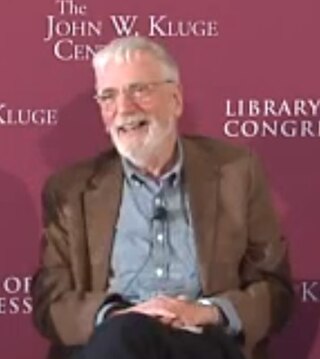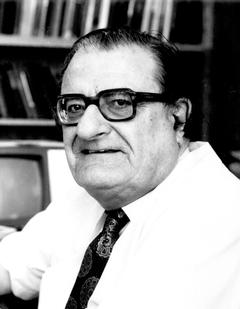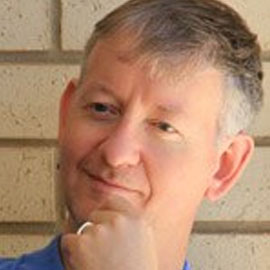Related Research Articles

Computational chemistry is a branch of chemistry that uses computer simulations to assist in solving chemical problems. It uses methods of theoretical chemistry incorporated into computer programs to calculate the structures and properties of molecules, groups of molecules, and solids. The importance of this subject stems from the fact that, with the exception of some relatively recent findings related to the hydrogen molecular ion, achieving an accurate quantum mechanical depiction of chemical systems analytically, or in a closed form, is not feasible. The complexity inherent in the many-body problem exacerbates the challenge of providing detailed descriptions of quantum mechanical systems. While computational results normally complement information obtained by chemical experiments, it can occasionally predict unobserved chemical phenomena.
Quantum chemistry, also called molecular quantum mechanics, is a branch of physical chemistry focused on the application of quantum mechanics to chemical systems, particularly towards the quantum-mechanical calculation of electronic contributions to physical and chemical properties of molecules, materials, and solutions at the atomic level. These calculations include systematically applied approximations intended to make calculations computationally feasible while still capturing as much information about important contributions to the computed wave functions as well as to observable properties such as structures, spectra, and thermodynamic properties. Quantum chemistry is also concerned with the computation of quantum effects on molecular dynamics and chemical kinetics.

Robert Ghormley Parr was an American theoretical chemist who was a professor of chemistry at the University of North Carolina at Chapel Hill.

Gerhard Heinrich Friedrich Otto Julius Herzberg, was a German-Canadian pioneering physicist and physical chemist, who won the Nobel Prize for Chemistry in 1971, "for his contributions to the knowledge of electronic structure and geometry of molecules, particularly free radicals". Herzberg's main work concerned atomic and molecular spectroscopy. He is well known for using these techniques that determine the structures of diatomic and polyatomic molecules, including free radicals which are difficult to investigate in any other way, and for the chemical analysis of astronomical objects. Herzberg served as Chancellor of Carleton University in Ottawa, Canada from 1973 to 1980.

John Charles Polanyi is a German-born Canadian chemist. He was awarded the 1986 Nobel Prize in Chemistry for his research in chemical kinetics.

W. Ford Doolittle is an evolutionary and molecular biologist. He is a member of the US National Academy of Sciences and a Fellow of the Royal Society of Canada and the Norwegian Academy of Science and Letters. He is also the winner of the 2013 Herzberg Medal of the Natural Sciences and Engineering Research Council of Canada and the 2017 Killam Prize.

Nicholas Charles Handy was a British theoretical chemist. He retired as Professor of quantum chemistry at the University of Cambridge in September 2004.

Michael James Steuart Dewar was an American theoretical chemist.

Henry Frederick "Fritz" Schaefer III is an American computational, physical, and theoretical chemist. He is one of the most highly cited chemists in the world, with a Thomson Reuters h-index of 121 as of 2020.

Włodzimierz Kołos was a Polish chemist and physicist who was one of the founders of modern quantum chemistry, and pioneered accurate calculations on the electronic structure of molecules.
Paul Bruce Corkum is a Canadian physicist specializing in attosecond physics and laser science. He holds a joint University of Ottawa–NRC chair in attosecond photonics. He also holds academic positions at Texas A&M University and the University of New Mexico. Corkum is both a theorist and an experimentalist.

John P. Perdew is a theoretical condensed matter physicist known for his contributions to the fields of solid-state physics and quantum chemistry. His work on density functional theory has led to him being one of the world's most cited physicists. Perdew currently teaches and conducts research at Tulane University.
Sourav Pal is an Indian theoretical chemist, former professor of chemistry at IIT Bombay, and former director of the Indian Institute of Science Education and Research, Kolkata. He was a director of the CSIR-National Chemical Laboratory in Pune and an adjunct professor at the Indian Institute of Science Education and Research, Pune.
Eric R. Bittner is a theoretical chemist, physicist, and distinguished professor of chemical physics at the University of Houston.

Donald Gene Truhlar is an American scientist working in theoretical and computational chemistry and chemical physics with special emphases on quantum mechanics and chemical dynamics.

Bidyendu Mohan Deb is an Indian theoretical chemist, chemical physicist and a professor at the Indian Institute of Science Education and Research, Kolkata (IISER). he is known for his studies in theoretical chemistry and chemical physics. He is an elected fellow of the International Union of Pure and Applied Chemistry, The World Academy of Sciences, Indian National Science Academy and the Indian Academy of Sciences. The Council of Scientific and Industrial Research, the apex agency of the Government of India for scientific research, awarded him the Shanti Swarup Bhatnagar Prize for Science and Technology, one of the highest Indian science awards, in 1981, for his contributions to chemical sciences.
Russell Jaye Boyd is a Canadian computational and theoretical chemist. He is Professor Emeritus at Dalhousie University in Halifax, Nova Scotia.
Erin Johnson is a Canadian computational chemist. She holds the Herzberg–Becke Chair at Dalhousie University. She works on density functional theory and intermolecular interactions.
Kim K. Baldridge is an American theoretical and computational chemist who works to develop quantum mechanical methodologies and apply quantum chemical methods to problems in life sciences, materials science, and general studies. She is professor and vice dean in the School of Pharmaceutical Science and Technology of Tianjin University in China, where she also directs the High Performance Computing Center.

Peter Malcolm Wallace Gill is a New Zealand theoretical and computational chemist known for his contribution to density functional theory (DFT). He is an early and main contributor to the computational chemistry software Q-Chem and was the president of the company during 1998–2013. He is especially known for developing the PRISM algorithm for evaluating two-electron integrals and linear-scaling DFT, as well as self-consistent field method for excited state electronic structure.
References
- ↑ "Axel Becke". Dalhousie University. Archived from the original on 2017-02-02. Retrieved 2017-01-24.
- ↑ "Axel Becke" . Retrieved 2019-07-15.
- ↑ "Fellows". Royal Society. Archived from the original on 30 November 2010. Retrieved 12 December 2010.
- ↑ "Chemist Axel Becke wins $1M Herzberg Medal". CBC. Retrieved 22 February 2015.
- ↑ "Axel Becke". Dalhousie University. Archived from the original on 30 March 2019. Retrieved 30 March 2019.
- "Profile of Axel D. Becke". International Academy of Quantum Molecular Science. Retrieved 2007-11-10.
- "Interview with Axel Becke" . Retrieved 2007-11-10.